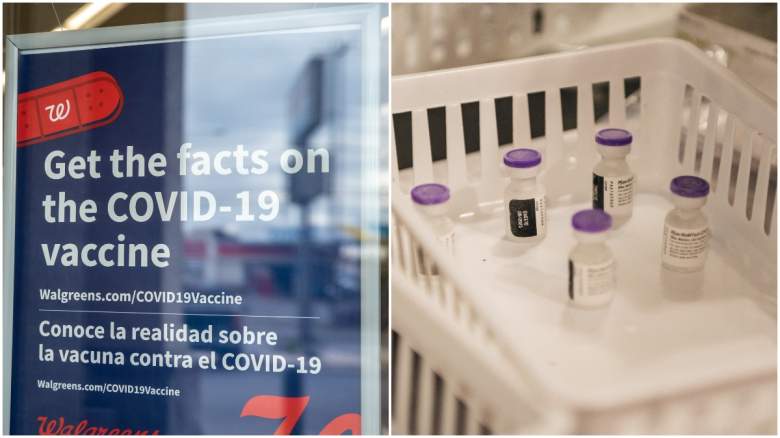
Getty
The COVID-19 Lambda variant is causing concern since emerging in the United States after spreading from South America.
It is one of multiple variants of the COVID-19 virus to hit the country and has rampaged through some South American countries, like Peru. The concern is that it is now spreading globally, and some studies have found it is very infectious and may be more resistant to some vaccines, although more research is needed and that’s far from clear.
“Viruses constantly change through mutation,” the Centers for Disease Control and Prevention explains. “A variant has one or more mutations that differentiate it from other variants in circulation. As expected, multiple variants of SARS-CoV-2 have been documented in the United States and globally throughout this pandemic.”
As of August 6, 2021, the CDC says that no COVID variant, including Lambda, has reached the worst category, called a “variant of high consequence.” Such variants would be more resistant to vaccines, cause more “severe clinical disease” and lead to increased hospitalizations. The concern, though, is over whether the Lambda variant could be worse than the current variant dominating the United States, Delta.
You can track and map the Lambda variant’s spread throughout the world through GISAID. According to that site, there were 1,060 cases of the Lambda variant detected in the United States as of August 6, 2021.
Here’s what you need to know:
1. The Lambda Variant Is Now in at Least 29 Countries & Is Extremely Dominant in Peru
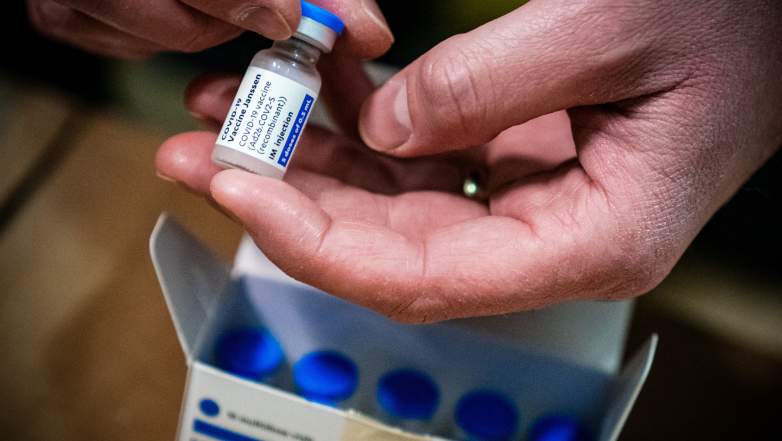
GettyA picture taken on April 12, 2021 shows a phial of Johnson & Johnson Janssen Covid-19 vaccine in the Netherlands.
The Lambda variant rapidly spread through some South American countries. According to a July 14, 2021, article in National Geographic, it “is now causing almost all new infections in Peru.”
It’s now in 29 countries, including the U.S., the site reported.
The article, The Emergence of SARS-CoV-2 Variant Lambda (C.37) in South America, which has not yet been peer reviewed, reported that the variant was noted in Lima, Peru, in late December 2020, and “now accounts for 97% of Peruvian public genomes in April 2021. It is expanding in Chile and Argentina, and there is evidence of onward transmission in Colombia, Ecuador, Mexico, the USA, Germany, and Israel. On June 15, 2021, the World Health Organization designated C.37 as Variant of Interest (VOI) Lambda.”
That site explains, “The earliest record of C.37 (Lambda)…is from Argentina in November 2020. By June 19, 2021, there were 1771 C.37 sequences from 25 countries, including Chile (n=670), USA (n=510), Peru (n=222), Argentina (n=86), Germany (n=79), Mexico (n=55), Spain (n=40), and Ecuador (n=39). Beyond Peru, C.37 has expanded rapidly in Chile and Argentina, reaching 33% and 12% of all sequenced genomes on GISAID by April 2021, respectively.”
According to National Geographic, Lambda is novel “because of the way its spike protein is altered compared to other variants. It has mutations at 14 positions.”
According to a June 2021 article on BMJ.com, Peru “has revised its official death toll in the covid-19 pandemic from 69 342 to 185 380, after a scientific review of medical records ordered by the government. The new figure means that Peru has had 5551 covid deaths per million population, proportionally the worst official toll in the world. Hungary, which before this week had the world’s highest official toll per capita, now stands a distant second at 3094 deaths per million.”
2. The CDC Does Not List Lambda Among Variants ‘of Concern’ But the World Health Organization Lists It as a Variant of Interest
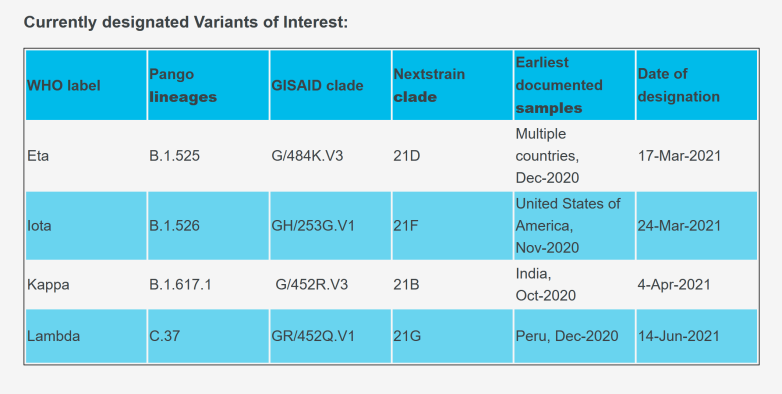
WHO
The World Health Organization lists the Lambda variant among four variants “of interest.” The others are Eta, Iota, and Kappa.
What is a variant of interest? According to WHO, it’s a variant “with genetic changes that are predicted or known to affect virus characteristics such as transmissibility, disease severity, immune escape, diagnostic or therapeutic escape; AND Identified to cause significant community transmission or multiple COVID-19 clusters, in multiple countries with increasing relative prevalence alongside increasing number of cases over time, or other apparent epidemiological impacts to suggest an emerging risk to global public health.”
As of August 6, 2021, the CDC did not list the lambda variant among its variants “of concern.” It did list four other variants. They are as follows:
Alpha – B.1.1.7
The CDC reported of this variant:
First identified: United Kingdom
Spread: Spreads much faster than other variants
Severe illness and death: May potentially cause more people to get sicker and to die
Vaccine: Currently authorized vaccines do work against this variant. Some breakthrough infections in fully vaccinated people are expected but remain rare. All vaccines are particularly effective against severe illness, hospitalization, and death.
Treatments: Treatments are effective against this variant
Beta – B.1.351
The CDC reported of this variant:
First identified: South Africa
Spread: May spread faster than other variants
Severe illness and death: Current data do not indicate more severe illness or death than other variants
Vaccine: Currently authorized vaccines do work against this variant. Some breakthrough infections are expected, but remain rare. All vaccines are particularly effective against severe illness, hospitalization and death.
Treatments: Certain monoclonal antibody treatments are less effective against this variant
Gamma – P.1
According to the CDC:
First identified: Japan/Brazil
Spread: Spreads faster than other variants
Severe illness and death: Current data do not indicate more severe illness or death than other variants
Vaccine: Currently authorized vaccines do work against this variant. Some breakthrough infections are expected, but remain rare. All vaccines are particularly effective against severe illness, hospitalization and death.
Treatments: Certain monoclonal antibody treatments are less effective against this variant
illustration of virus in green
Delta – B.1.617.2
According to the CDC:
First identified: India
Spread: Spreads much faster than other variant
Severe illness and death: May cause more severe cases than the other variants
Vaccine: Infections happen in only a small proportion of people who are fully vaccinated, even with the Delta variant. Some breakthrough infections are expected, but remain rare. However, preliminary evidence suggests that fully vaccinated people who do become infected with the Delta variant can spread the virus to others. All vaccines are particularly effective against severe illness, hospitalization and death.
Treatments: Certain monoclonal antibody treatments are less effective against this variant
Heavy spoke to Dr. Jeremy Kamil, who is an Associate Professor of Microbiology and Immunology at Louisiana State University (LSU) Health Shreveport. He leads COVID-19 sequencing at LSU Health Shreveport and his research lab focuses on virus biology, using molecular genetics and pharmacology.
He believes a doomsday variant is extremely unlikely and that people should be talking instead about the importance of getting vaccinated because variants can develop when large numbers of people do not.
The doomsday variant talk is “extremely unlikely. It’s more of a morbid curiosity” that people have, he said.
Kamil said he would put the chances of a doomsday variant “at almost zero.” He thinks the talk derives from the psychological aspects of the pandemic. “It’s scary enough” so people up the ante like it’s a “zombie movie.” In reality, an extremely lethal mutation of COVID probably won’t happen, he said.
He said that the world has dealt with pandemics before, like influenza, and “they didn’t turn into a super virus that wiped everyone out…It’s slightly ridiculous.”
What people should be talking about, he believes, is “vaccine misinformation” that is preventing large numbers of people from getting vaccinated. He said the Delta variant is more infectious than the variants it knocked out and is spreading through unvaccinated populations and places where people have gone back to normal, behaving as they did pre-pandemic. This is starting to overwhelm the hospital systems in some states.
Kamil said that all viruses mutate. “Variants are very common, and they happen with all viruses,” he said.
According to Kamil, in addition to Lambda, a virus out of Colombia is causing some interest. It’s known by it’s code, B.1.621. He said that “everyone was talking about Alpha, and now Delta is knocking Alpha off table and yet Lambda is showing up.” Right now, he said that Lambda is showing up in very small numbers compared to Delta. However, the fact it’s showing up at all is drawing the attention of researchers. It will take time to see whether it takes hold or burns itself out, he said.
As for B.1.621? That variant now makes up 10% of cases in Miami, according to Fortune.
“People talk about variants and talk about scary mutations in the spike protein. Those mutations are the result of very rare events,” Kamil said. The concern is that new variants will spread faster and more easily, especially through unvaccinated populations.
3. The Lambda Variant Was Detected in 44 States, Including Texas, California & Louisiana
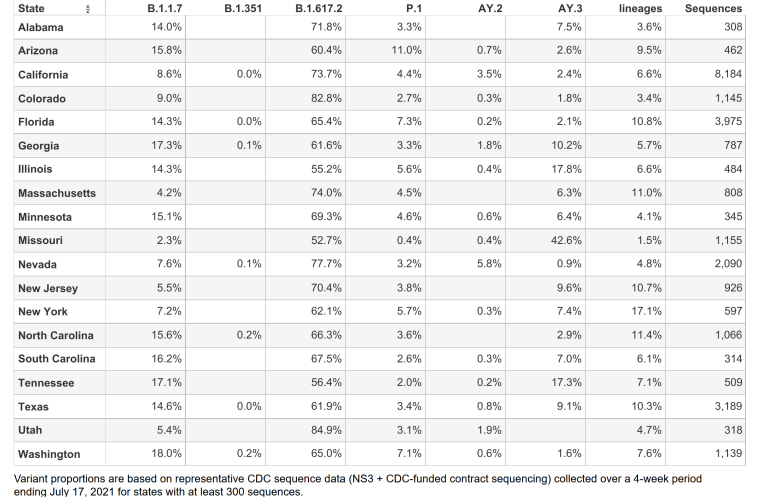
CDC
The variant has been detected in 44 states but is only 0.17% of all variants, a low proportion, according to Newsweek.
On July 21, a major Texas hospital reported a case of the Lambda variant, according to ABC 7.
According to WBRZ-TV, in August, the Lambda variant was detected in Louisiana.
“I do know that with the proximity with Texas, there have been a few cases detected in North Louisiana with the Lamda variant. But we don’t know whether this is going to be a more aggressive or less aggressive virus,” Dr. Aldo Russo, the medical director at Ochsner said to the television station. He revealed that Peru was using a Chinese vaccine that wasn’t as effective against the strain.
SFGate reported that, as of late July, there were “144 documented cases of the lambda variant in California.”
One researcher, Fenyong Liu, an epidemiologist at the UC Berkeley, told SFGate “we should be very, very concerned,” saying, “I feel that we really need to pay attention to it because the variant has been circulating since 2020, restricted largely to South America, but now it’s going global.”
According to the Tennessean, experts are concerned the Lambda variant may be as infectious as Delta but more resistant to vaccines.
4. More Research Is Needed on Whether the Vaccines Work on the Variant

GettyDirector of the National Institute of Allergy and Infectious Diseases Anthony Fauci listens during the daily briefing on the novel coronavirus, COVID-19, in the Brady Briefing Room at the White House on April 6, 2020, in Washington, DC.
According to CNBC, more research is needed to determine whether vaccines work on the Lambda variant.
One study found that the vaccines are still effective against Lambda. “The results suggest that vaccines in current use will remain protective against the lambda variant and that monoclonal antibody therapy will remain effective,” found the article, SARS-CoV-2 Lambda Variant Remains Susceptible to Neutralization by mRNA Vaccine-elicited Antibodies and Convalescent Serum, which has not yet been peer-reviewed.
The study noted, “The lambda spike protein contains novel mutations within the receptor binding domain (L452Q and F490S) that may contribute to its increased transmissibility and could result in susceptibility to re-infection or a reduction in protection provided by current vaccines.”
However, another study, Infectivity and immune escape of the new SARS-CoV-2 variant of interest Lambda, also not peer-reviewed, raised concerns about the variant’s strength against vaccines, noting, “Our results indicate that mutations present in the spike protein of the Lambda variant of interest confer increased infectivity and immune escape from neutralizing antibodies elicited by CoronaVac. These data reinforce the idea that massive vaccination campaigns in countries with high SARS-CoV-2 circulation must be accompanied by strict genomic surveillance allowing the identification of new isolates carrying spike mutations and immunology studies aimed to determine the impact of these mutations in immune escape and vaccines breakthrough.”
Dr. Anthony Fauci recently warned in a McClatchy interview that a more dangerous variant than the infectious Delta is possible if more people don’t get the vaccine.
Although he didn’t use the terminology “doomsday variant,” Fauci’s August 2021 comments to McClatchy News Service are raising concerns.
“If another one comes along that has an equally high capability of transmitting but also is much more severe, then we really could be in trouble,” Fauci told McClatchy. Fauci told the news service that he is concerned by the potential for the virus to produce a new, more dangerous variant if more people don’t get the COVID-19 vaccines.
“What we’re seeing, because of this increase in transmissibility, and because we have about 93 million people in this country who are eligible to get vaccinated who don’t get vaccinated — that you have a significant pool of vulnerable people,” said Fauci.
Fauci is concerned that a variant could prove immune to the vaccines.
“If we don’t crush the outbreak to the point of getting the overwhelming proportion of the population vaccinated, then what will happen is the virus will continue to smolder through the fall into the winter, giving it ample chance to get a variant which, quite frankly, we’re very lucky that the vaccines that we have now do very well against the variants — particularly against severe illness,” Fauci said to McClatchy.
“We’re very fortunate that that’s the case. There could be a variant that’s lingering out there that can push aside delta. If another one comes along that has an equally high capability of transmitting but also is much more severe, then we could really be in trouble.”
CDC notes, “All COVID-19 vaccines currently authorized in the United States are effective against COVID-19, including serious outcomes of severe disease, hospitalization, and death…However, the risk for SARS-CoV-2 breakthrough infection in fully vaccinated people cannot be completely eliminated as long as there is continued community transmission of the virus.”
5. The Delta Variant Is the Most Dominant Variant in the US
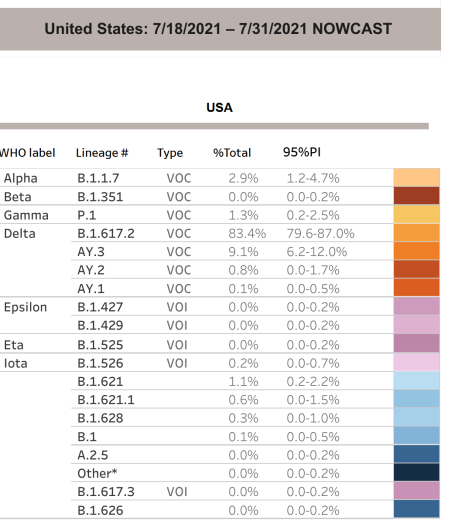
CDC
As of August 6, 2021, the CDC explained, “Most U.S. states and jurisdictions are experiencing substantial or high levels of community transmission fueled by the spread of the highly contagious B.1.617.2 (Delta) variant. COVID-19 cases, hospitalizations, and deaths continue to increase, especially in communities with lower vaccination coverage. While the number of people getting vaccinated also continues to increase, many people remain unsure about getting vaccinated, and others do not plan to do so.”
According to the CDC, as of August 6, 2021, more than 35 million people had contracted COVID-19, and more than 612,000 people had died from it
The 7-day case rate per 100,000 people was highest in Florida, Mississippi, Arkansas, and Louisiana.
More than 492 million COVID tests have been performed.
Only four variants are classified as variants of concern in the U.S.: “The B.1.1.7 (Alpha), B.1.351 (Beta), B.1.617.2 (Delta), and P.1 (Gamma) variants circulating in the United States are classified as variants of concern.” No variants have been classified as “high consequence.”
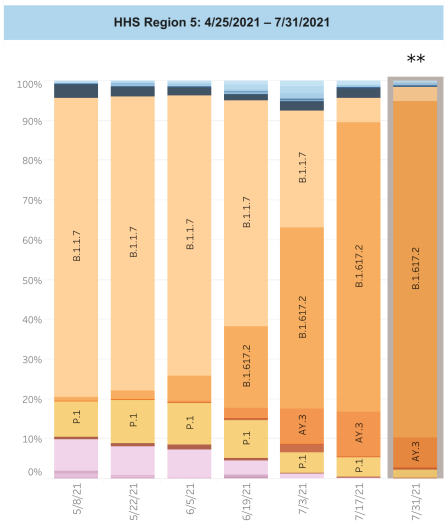
CDC
According to the Centers for Disease Control and Prevention, genetic variants of SARS-CoV-2 “have been emerging and circulating around the world throughout the COVID-19 pandemic.”
CDC notes, “Viral mutations and variants in the United States are routinely monitored through sequence-based surveillance, laboratory studies, and epidemiological investigations.”
The CDC classifies variants into three categories,
Variant of Interest. Defined as “A variant with specific genetic markers that have been associated with changes to receptor binding, reduced neutralization by antibodies generated against previous infection or vaccination, reduced efficacy of treatments, potential diagnostic impact, or predicted increase in transmissibility or disease severity.”
Variant of Concern. Defined as “A variant for which there is evidence of an increase in transmissibility, more severe disease (e.g., increased hospitalizations or deaths), significant reduction in neutralization by antibodies generated during previous infection or vaccination, reduced effectiveness of treatments or vaccines, or diagnostic detection failures.”
Variant of High Consequence. Defined as “A variant of high consequence has clear evidence that prevention measures or medical countermeasures (MCMs) have significantly reduced effectiveness relative to previously circulating variants.”
According to the CDC, viruses “constantly change through mutation,” but sometimes the new variants simply disappear.
“Viruses constantly change through mutation, and new variants of a virus are expected to occur,” they say. “Sometimes new variants emerge and disappear. Other times, new variants persist. Multiple variants of the virus that causes COVID-19 have been documented in the United States and globally during this pandemic.”
The CDC noted, “Viruses constantly change and become more diverse. Scientists monitor these changes, including changes to the spikes on the surface of the virus. By carefully studying viruses, scientists can learn how changes to the virus might affect how it spreads and how sick people will get from it.”
They used an analogy of a tree to explain this process. “If you think about a virus like a tree growing and branching out; each branch on the tree is slightly different than the others. By comparing the branches, scientists can label them according to the differences. These small differences, or variants, have been studied and identified since the beginning of the pandemic,” CDC explained.
“Some variations allow the virus to spread more easily or make it resistant to treatments or vaccines. Those variants must be monitored more carefully.”